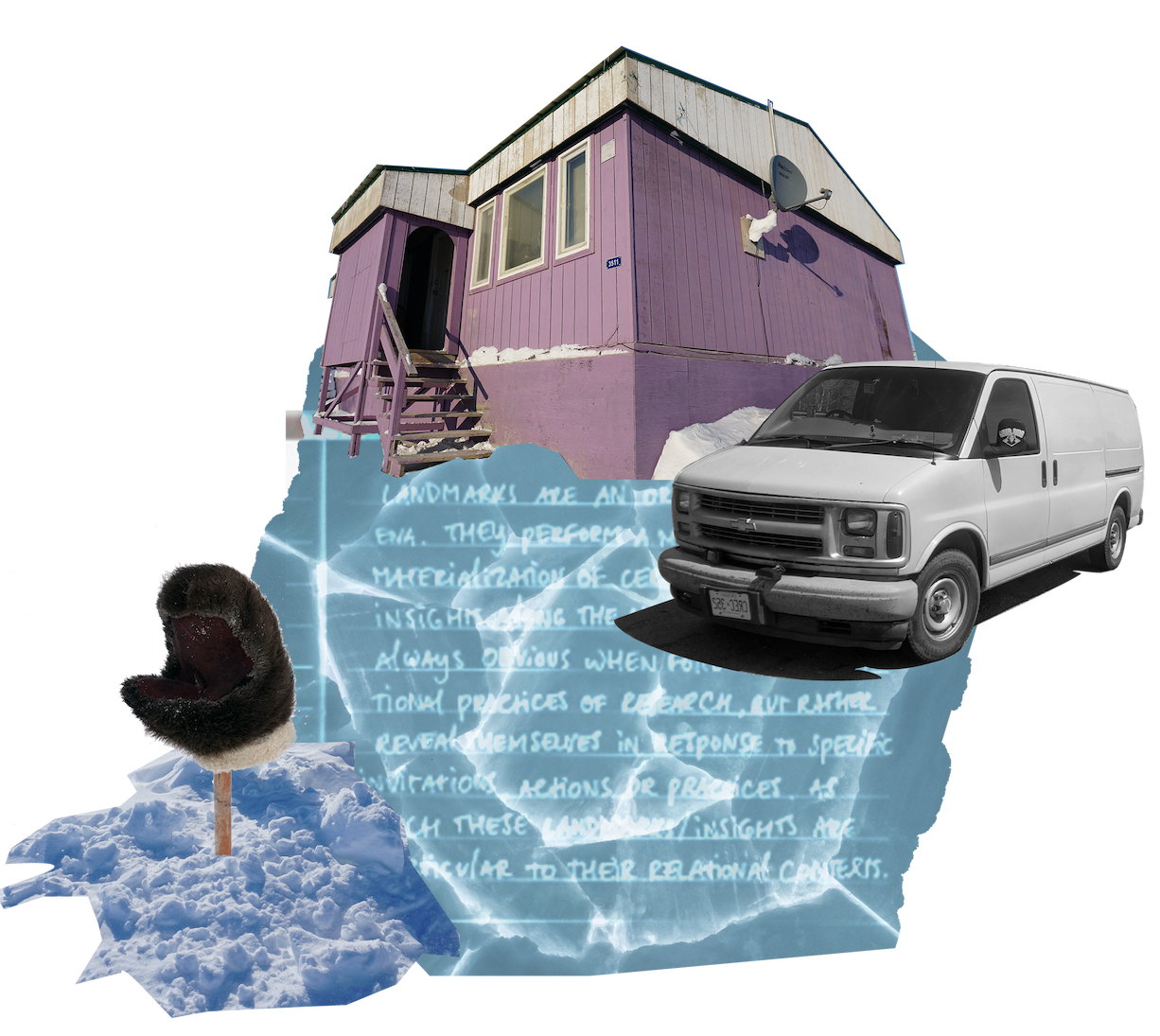Becoming Other: Difference between revisions
No edit summary |
No edit summary |
||
| (10 intermediate revisions by the same user not shown) | |||
| Line 1: | Line 1: | ||
[[File:Landmark.png|thumb]] | [[File:Landmark small.png|thumb]] | ||
To become other, is not to become ''the'' other. It is to inhabit a liminal space and configure new shifting positionalities of response-ability. | |||
Attending the pre-workshop as Mx. Science, contributed to such a shift. It initiated a relational shift between me and Tuppittia, our interpreter, who I had already been collaborating with closely. I was renamed "Nukatugaq" (Inuktitut for Young male polar bear cub) by the pre-workshop participants, and entered into another space of relating to Tuppitttia as a Tiguaq (adoptee) and her becoming my Tighuaghiq (adopter). Before this moment, we had been collaborating on the basis of mutual respect, there was now also a more explicit element of care that was introduced to our relationship. | |||
Tuppittia: ''"We are bonded through a common goal now. It's possible, even if we are not from the same culture. You are family now. There is no running away. We hold a responsibility for each other. It's like a contract."'' | |||
Saskia: ''"So like, I'm not Inuit, I will never be Inuit. Right? But by taking, by, by making that bond or that contract, like, um, you step into a middle space. Yes. And I think the way that you were collaborating so closely with us, I guess, put you in a middle position as well."'' | |||
Tupittia: ''"Yes. And I felt that we were representing this alongside each other. I think so too now that I look at it, yeah, that people could see that it's possible. Whoa. To have, you know, we're not the same culture, or even, you know, all that, but then we work together, like, we're bonded, you know, it is the common goal, right?"'' | |||
''"The growth, the love, you know, the human growth, you know, to go to, to acknowledge our humanity in a good way. Right? Yeah, that's, and it's a fearsome place to be actually. It's actually a very strong and fearsome place to be where, where nothing can come between us, you know? That's kind of like what it's, family, right?"'' | |||
<div class="next_choice">The tracks split here. | <div class="next_choice">The tracks split here. | ||
'''Return''' towards Cut 2:"Drag as a Diffractive Method", if you want to learn more about Mx. Science as a method. | |||
Or, | |||
'''Return''' towards the drafting of a "terms of engagement", if you want to learn how the presence of Mx. Science materialized within the Gjoa Haven final workshops, and learn more about the other aspects of the workshop preparation. </div> | |||
<span class="return to-cut-2 link" data-page-title=" | <span class="return to-cut-2 link" data-page-title="Point of Beginning Mx. Science" data-section-id="3" data-encounter-type="return">[[Point of Beginning Mx. Science#The Liminal Scientist|Return to Cut 2: The Liminal Scientist ]]</span> | ||
<span class="return to-cut-2 link" data-page-title=" | <span class="return to-cut-2 link" data-page-title="Workshop Gjoa Haven" data-section-id="3" data-encounter-type="return">[[Point of Beginning (Pre-)workshops#Terms of Engagement|Return to Cut 2: Terms of Engagement]]</span> | ||
Latest revision as of 12:52, 18 July 2025

To become other, is not to become the other. It is to inhabit a liminal space and configure new shifting positionalities of response-ability.
Attending the pre-workshop as Mx. Science, contributed to such a shift. It initiated a relational shift between me and Tuppittia, our interpreter, who I had already been collaborating with closely. I was renamed "Nukatugaq" (Inuktitut for Young male polar bear cub) by the pre-workshop participants, and entered into another space of relating to Tuppitttia as a Tiguaq (adoptee) and her becoming my Tighuaghiq (adopter). Before this moment, we had been collaborating on the basis of mutual respect, there was now also a more explicit element of care that was introduced to our relationship.
Tuppittia: "We are bonded through a common goal now. It's possible, even if we are not from the same culture. You are family now. There is no running away. We hold a responsibility for each other. It's like a contract."
Saskia: "So like, I'm not Inuit, I will never be Inuit. Right? But by taking, by, by making that bond or that contract, like, um, you step into a middle space. Yes. And I think the way that you were collaborating so closely with us, I guess, put you in a middle position as well."
Tupittia: "Yes. And I felt that we were representing this alongside each other. I think so too now that I look at it, yeah, that people could see that it's possible. Whoa. To have, you know, we're not the same culture, or even, you know, all that, but then we work together, like, we're bonded, you know, it is the common goal, right?"
"The growth, the love, you know, the human growth, you know, to go to, to acknowledge our humanity in a good way. Right? Yeah, that's, and it's a fearsome place to be actually. It's actually a very strong and fearsome place to be where, where nothing can come between us, you know? That's kind of like what it's, family, right?"
Return towards Cut 2:"Drag as a Diffractive Method", if you want to learn more about Mx. Science as a method.
Or,
Return towards the drafting of a "terms of engagement", if you want to learn how the presence of Mx. Science materialized within the Gjoa Haven final workshops, and learn more about the other aspects of the workshop preparation.